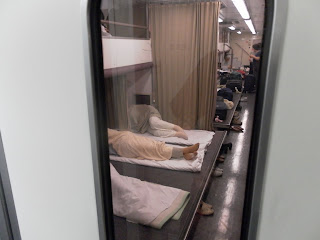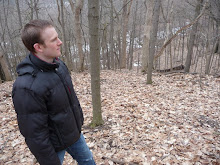
Of the many people and places I was hoping to visit, one of the non-negotiables was a tiny shop, not much bigger than some walk-in closets, crammed between an octopus stand and an antique store in the rural town of Okayama.

Barrels of coffee beans line either side, making it almost impossible to enter, let alone move around. I stumbled across Shimoyama-san's coffee shop when I got lost one day when I lived in Okayama, but I soon became a regular customer. Despite the language barrier at the time, he and I became fast friends through our shared love of good coffee. As my Japanese abilities increased, we began to discuss coffee, philosophy, politics, and religion over a cup or two as he custom-roasted some of the best coffee beans I've found anywhere in the world. I've had the opportunity to share the gospel with him piecemeal over my two years in Okayama, but it still hasn't quite sunk in yet. However, I had become quite close to him and his family, and we had even kept in touch somewhat over the last four years I've been at Trinity.
I wasn't able to contact Shimoyama-san to let him know that I was in Japan, so I decided to just walk into his shop instead. The look on his face was priceless as midway through his welcome he realized who I was. We enjoyed several cups of coffee together as he roasted my usual order and caught up over the past four years. Because of the heavy rain (rainy season just started), there were hardly any customers, so we were able to talk for quite a long time. Right in the middle of the conversation he asked me a question that lead into a full-blown explanation of the gospel from start to finish. Knowing that my time here is so limited, I was thrilled to have the chance to share my faith clearly one more time. I'm certain that he understood it. I'll be having dinner with him and his family this Saturday, so please pray for this next encounter.
Before I left the shop, I asked for some of the chaff left over from roasting the beans (the roasting process produces a lot of chaff), to use as a visual aid for the lesson I was preparing to teach the high school students at Madoka's church. The lesson is on Psalm 1, which says that the wicked are blown away like chaff, in contrast to the tree planted by streams of water, which stands firm. This afforded the opportunity to briefly share this Psalm with him as well.
I left the shop, exuding gratitude and the smell of coffee, and as the rain grew worse, I found a bench under an awning to sit and work on my lesson. However, before to long a woman approached me and asked what I was reading. I said it was a Bible and to my surprise, rather than being scared off, she sat down and asked me what it said. I read her Psalm 1, and she told me it brought tears to her eyes. We talked for a while about this Psalm and about the gospel. She was very moved, and told me that today was her birthday, and that she thought God must have sent me to meet her.
Bible study with the youth group went very well tonight (they loved the illustration of the chaff), and I had the chance to encourage some others in their study of the Bible after that. But what sticks out to me most at the end of the day is how well today's encounters illustrate the main point of my lesson from Psalm 1--that all of us have chosen to walk in the way of the wicked, and that it is by the grace of Jesus Christ alone that we are not only set on the path of the righteous again, but also made to bear fruit. God used the rain and other coincidences to direct my path to these chance encounters, and though I have little to offer on my own, he has given me a profound and powerfully moving story--the story of his gospel--to share with all who ask. Somehow he transformed this less-than-worthless chaff into a deeply rooted tree, and I am grateful to be the one through whom he chose to work today.




 Room service.
Room service.















 After four years, I was able to see my old friend Kazu again. Here is a picture of us in a Japanese market, and yes, that is a chilled cucumber on a stick that we're eating like it's a popsicle.
After four years, I was able to see my old friend Kazu again. Here is a picture of us in a Japanese market, and yes, that is a chilled cucumber on a stick that we're eating like it's a popsicle.








